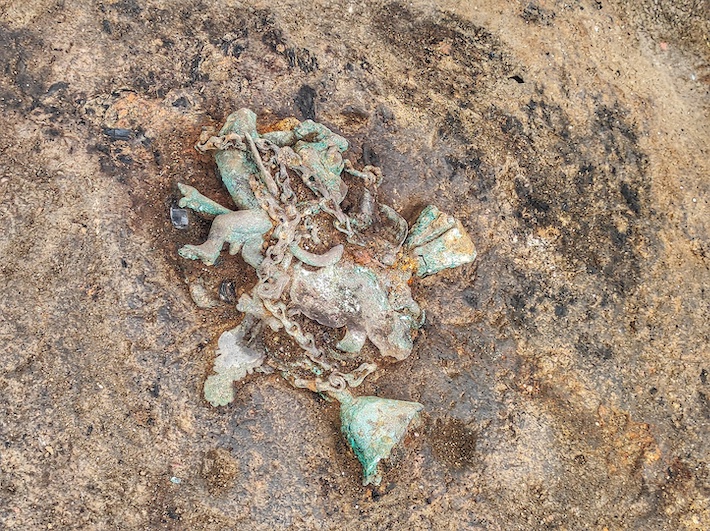 BELGRADE, SERBIA—Live Science reports that a tintinnabulum, or Roman wind chime, has been uncovered in eastern Serbia at the Viminacium archaeological site. The city was the capital of Rome’s Upper Moesia province between the first and fifth centuries A.D. The bronze artifact, found near the porch of a large home on a main city street, features a prominent phallus with wings, legs, and a tail. It has not yet been removed from its surrounding soil. “Judging by what can be seen … it had four bells and the chain from which it hung,” said Ilija Danković of Belgrade’s Institute of Archaeology. The phallus symbol was believed to bring good fortune, prosperity, and happiness while combating the evil eye and deterring thieves. This tintinnabulum was likely imported to Viminacium, and suggests that its residents shared Roman beliefs, Danković concluded. To read about an ancient ship unearthed in a strip mine near Viminacium, go to "Roman River Cruiser."
BELGRADE, SERBIA—Live Science reports that a tintinnabulum, or Roman wind chime, has been uncovered in eastern Serbia at the Viminacium archaeological site. The city was the capital of Rome’s Upper Moesia province between the first and fifth centuries A.D. The bronze artifact, found near the porch of a large home on a main city street, features a prominent phallus with wings, legs, and a tail. It has not yet been removed from its surrounding soil. “Judging by what can be seen … it had four bells and the chain from which it hung,” said Ilija Danković of Belgrade’s Institute of Archaeology. The phallus symbol was believed to bring good fortune, prosperity, and happiness while combating the evil eye and deterring thieves. This tintinnabulum was likely imported to Viminacium, and suggests that its residents shared Roman beliefs, Danković concluded. To read about an ancient ship unearthed in a strip mine near Viminacium, go to "Roman River Cruiser."
Roman Windchime Discovered in Serbia
